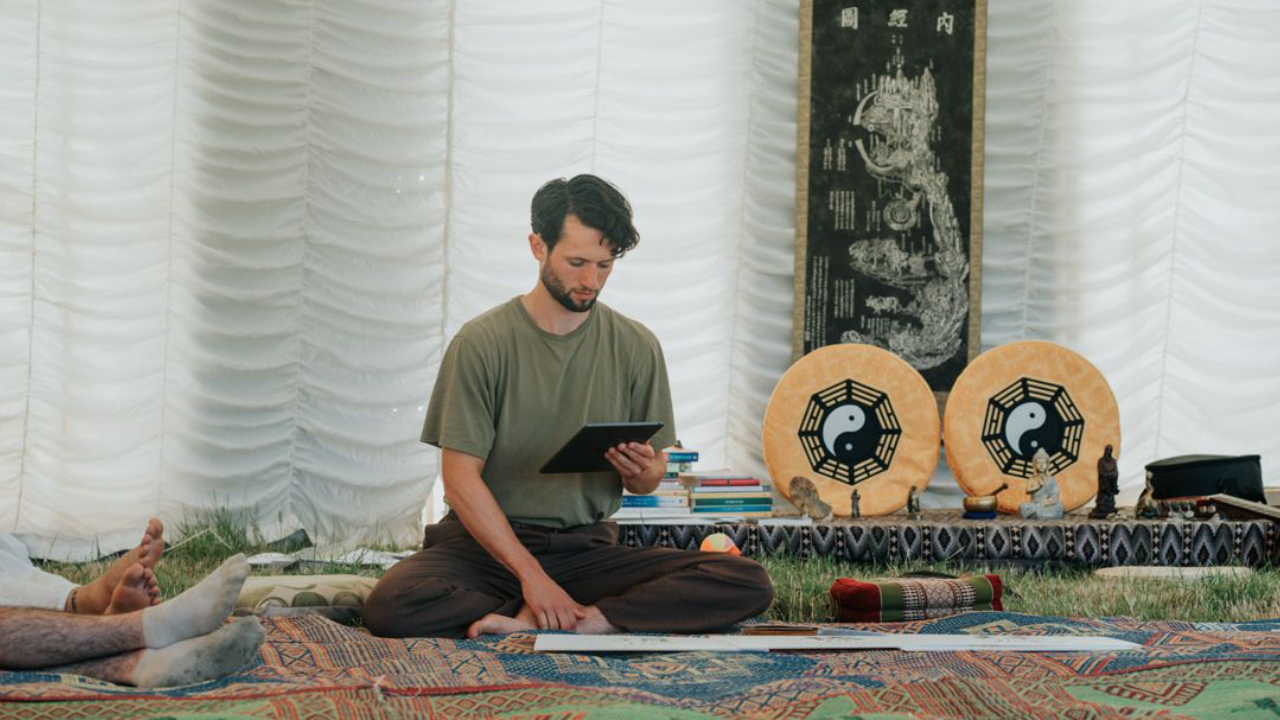Best Guided Meditation For Sleep
Dec 21, 2023
Guided meditations for sleep serve as a bridge, leading you gently into the realm of deep relaxation and restorative slumber. These carefully crafted sessions combine soothing narratives, calming music, and mindful breathing exercises, creating an ideal environment for the mind and body to unwind. Whether you're battling insomnia, or stress, or simply seeking a more tranquil sleep experience, guided meditation offers a natural, effective solution. By integrating this practice into your nightly routine, you can transform your sleep quality and embrace the rejuvenating power of undisturbed rest.
Table of Contents
Importance of Sleep
Sleep is fundamental to our overall well-being, influencing our physical health, mental acuity, and emotional stability. It plays a crucial role in healing and repairing the heart and blood vessels, reducing the risk of chronic diseases. Adequate sleep boosts immunity, enhances brain function, and supports growth and development. It's also key for maintaining a healthy weight and balancing hormones. Neglecting sleep can lead to serious health issues, impaired judgment, and decreased productivity. Understanding its significance is the first step toward prioritizing and improving sleep quality.
Meditation as a Solution for Sleep Issues
Meditation, particularly guided forms, has emerged as an effective solution for sleep-related challenges. It helps in:
- Reducing Stress: By calming the mind, meditation lowers stress levels, often the root cause of sleep disturbances.
- Enhancing Relaxation: It promotes relaxation, making falling and staying asleep easier.
- Improving Sleep Quality: Regular practice can deepen sleep and enhance its restorative effects.
- Balancing the Mind: Meditation helps in managing anxiety and depression, which are common culprits of sleep issues.
By integrating meditation into their nightly routine, individuals can significantly improve their sleep patterns and overall health.
Understanding Guided Meditation
A narrator or instructor guides a person through a meditative experience during guided meditation. This form of meditation is particularly beneficial for beginners or those who find it challenging to concentrate or quiet their minds independently. In guided meditation, the instructor's voice provides directions and often follows a specific theme or goal, such as relaxation, stress reduction, or sleep improvement.
Guided Meditation For Sleep: Best Practices
Guided meditation for sleep is a transformative practice, offering a path to deeper relaxation and restorative sleep. Here are some key practices:
- Consistent Schedule: Practice meditation at the same time each night to establish a routine.
- Comfortable Setting: Choose a quiet, comfortable space. Dim lights and ensure a relaxed posture.
- Short Sessions: Start with 5-10 minute sessions, gradually increasing as you become more comfortable.
- Focus on Breath: Concentrate on your breathing to anchor your mind and reduce wandering thoughts.
- Guided Imagery: Use calming imagery to gently transition from wakefulness to sleep.
Top 3 Guided Meditation Techniques for Better Sleep
Guided meditation offers a variety of techniques to enhance sleep quality. Each technique, with its unique focus and approach, caters to different needs and preferences.
Body Scan Meditation
In body scan meditation, you focus on each part of your body sequentially. Starting from the toes and moving upwards to the crown of the head. This practice promotes deep relaxation and awareness. It helps release physical tension, a key characteristic for promoting better sleep.
Benefits:
- Reduces physical stress
- Enhances bodily awareness
- Promotes relaxation
Mindfulness Meditation
Mindfulness meditation centers on breathing and awareness of the present moment. It involves observing thoughts and sensations without judgment. This technique is essential for calming a restless mind, a principle important for sleep.
Benefits:
- Decreases anxiety
- Improves focus
- Encourages a peaceful mind
Visualization Techniques
Visualization involves imagining a peaceful and restful scene, such as a tranquil beach or a quiet forest. This technique can significantly reduce bedtime anxiety and stress, key elements for a restful night.
Benefits:
- Lowers stress levels
- Fosters a sense of calm
- Prepares the mind for sleep
Each technique, when practiced consistently, can significantly improve the quality of sleep. They are accessible and easy to incorporate into your nightly routine, offering a natural and effective way to enhance sleep.
Common Challenges in Meditation for Sleep
Mind Wandering During Meditation
One common challenge faced during meditation for sleep is the tendency of the mind to wander. As you sit quietly, thoughts about the day's events or worries about the future may intrude, making it difficult to focus on the meditation process. This can be particularly frustrating for beginners who are not yet accustomed to the practice of redirecting their attention. To manage this, it's helpful to acknowledge these thoughts without judgment and gently guide your focus back to the meditation, be it your breath, a sound, or a guided voice. Consistent practice enhances the ability to maintain focus.
Difficulty in Finding a Comfortable Position
Finding a comfortable position for meditation is crucial, yet often challenging. Discomfort can distract from the meditative process and hinder relaxation. It's important to experiment with different postures, whether it's sitting, lying down, or even reclining, to find what works best for you. Using cushions, supportive chairs, or lying on a yoga mat can also aid in achieving a comfortable position. Remember, comfort is key in meditation, so don't hesitate to adjust your posture as needed.
Falling Asleep Too Quickly
While the goal of meditation for sleep is to promote relaxation and eventual sleep, falling asleep too quickly during the process can be counterproductive, especially if you wish to complete a guided session. To prevent this, consider sitting up rather than lying down, as this can help maintain a level of alertness. Additionally, meditating in a slightly cooler room can prevent the too-cozy warmth that often induces sleepiness.
Feeling Restless or Anxious
Restlessness or anxiety during meditation can stem from the pressure to 'do it right' or from the day’s stress. It's important to approach meditation with a sense of gentleness and self-compassion. Acknowledge your restlessness or anxiety as a natural part of the human experience, and gently refocus on your meditation. Deep, controlled breathing can also help alleviate feelings of anxiety.
Inconsistent Practice and Lack of Routine
Consistency is a key factor in reaping the benefits of meditation for sleep. An irregular meditation schedule can make it difficult to develop a habit, and thus, less effective. Setting a specific time for meditation, such as before bedtime, can help integrate this practice into your daily routine. Consistency not only enhances the meditative experience but also reinforces the sleep-promoting benefits of the practice.
Conclusion
As we conclude our journey into the serene world of guided meditation for sleep, it's clear that this practice holds the key to unlocking deeper, more restful slumber. By guiding the mind away from the day's stresses and easing the body into a state of relaxation, guided meditation can be a transformative tool for anyone seeking solace in sleep. Have you experienced the transformative effects of guided meditation in your sleep routine?
FAQs
1. How long should a guided meditation for sleep session last to be effective?
An effective guided meditation session for sleep typically lasts between 10 to 30 minutes, tailored to individual relaxation needs.
2. Can guided meditation help with chronic insomnia?
Yes, guided meditation can be beneficial for chronic insomnia, promoting relaxation and improving sleep patterns over time.
3. Is it necessary to have previous meditation experience to benefit from guided meditation for sleep?
No, previous experience is not necessary. Guided meditation is designed to be accessible for beginners and experienced practitioners alike.
4. Can I use guided meditation for sleep if I have difficulty staying focused?
Absolutely. Guided meditation often includes focus-enhancing techniques, making it suitable for those with concentration difficulties.
5. Are there specific types of guided meditations that are more effective for sleep?
Guided meditations focusing on relaxation techniques, such as body scans or visualization, are particularly effective for promoting sleep.







